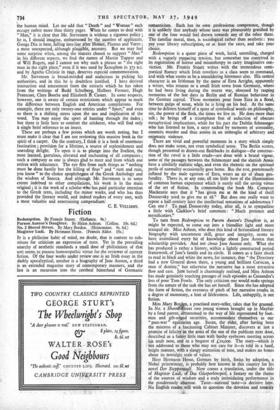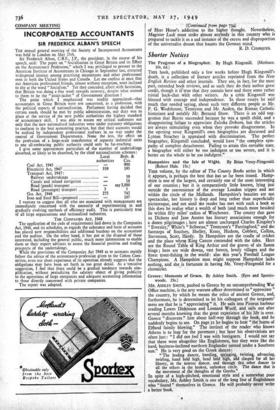Fiction
Redemption. By Francis Stuart. (Gollancz. 9s.)
IT is a philistine habit of mind, no doubt, that is content to sub- stitute for criticism an expression of taste. Yet in the prevailing anarchy of aesthetic standards a small dose of philistinism of that sort seems to possess homoeopathic virtue for the reviewer of current fiction. Of the four works under review one is an Irish essay in the darkly apocalyptical, another is a biography of Jane Austen, a third is an extended magazine story of contemporary manners, and the last is an excursion into the cerebral hinterland of Germanic
romanticism. Each has its own professional competence, though it is unlikely that anybody whose taste was pleasurably gratified by one of the four would feel drawn towards any of the other three. The familiar moral, then, is sociological rather than aesthetic: you pay your library subscription, or at least the rates, and take your choice.
Redemption is a queer piece of work, lurid, unsmiling,, charged with a vaguely menacing tension, but somewhat too contrived in its registration of horror and misanthropy to carry imaginative con- viction. Mr. Francis Stuart writes with the tremendous semi- poetical fluency which Irish novelists as a class seem to command, and with what seems to be a smouldering bitterness also. His central character is an Irishman by the name of Ezra Arrigho, apparently a writer, who returns to a small Irish town from Germany, where he had been living during the recent war, obsessed by rasping memories of the last days in Berlin and of Russian behaviour in the German capital. These memories pour from Ezra in a flood, between gulps of stout, while he is lying on his bed. At the same time he delivers himself of a spate of symbolical words on philosophy, sin, the power of the flesh, the times we live in. He does more than talk ; he brings off a triumphant feat of seduction of obscure metaphysical implications, while for his part the Dublin fishmonger who has listened to him, a satyr racked by torments of sensuality, commits murder and thus assists in an imbroglio of arbitrary and enigmatic violence.
There are vivid and powerful moments in a story which simply does not make sense, not even symbolical sense. The Berlin scenes, though presented in drawn-out flashbacks in dialogue—the construc- tion of the novel is a little crude—are done with a brutal vigour, some of the passages between the fishmonger and the sluttish Annie have a similarly realistic edge, and even the rhetoric on the spiritual perils of normality occasionally goes home. But the rest, portentously inflated by the male egotism of Ezra, wears an air of sham pro- fundity. There is, at any rate, all too little here of the illumination of common human experience which is surely still the saving virtue of the art of fiction. In commending the book Mr. Compton Mackenzie says that it " has given me at 66 the kind of thrill Dostoevsky used to give me at 16." " But does one really want to repeat a half-century later the intellectual sensations of adolescence ? Can one ? To read Dostoevsky today, after all, is to sympathise a little with Chekhov's brief comment: " Much pretence and mystification."
To turn from Redemption to Parson Austen's Daughter is, as might be expected, to come out into a friendlier light and more tranquil air. Miss Ashton, who does this kind of fictionalised literary biography with uncommon skill, grace and integrity, seems to have assimilated every bit of knowledge about Jane Austen that scholarship provides. And not about Jane Austen only. What she has produced is rather a history, within a lightly constructed period framework, of Jane's family and its circle. It comes as a faint shock to read in black and white the news, for instance, that " the Directory had a new General down there, a young and brilliant Corsican, a man of destiny," but otherwise the narrative has a most attractive flow and ease. Jane herself is charmingly realised, and Miss Ashton has made genuinely touching passages of such episodes as Cassandra's loss of poor Tom Fowle. The only criticism one would make springs from the nature of the task she has set herself. Since she has adopted the form of fiction, the evenness of pitch of her narrative results in a degree of monotony, a hint of lifelessness. Life, unhappily, is not fiction.
Miss Mary Borkisn, a practised story-teller, takes that for granted.
In No. 2 Shovel" two young women brought up in Mayfair by a fond parent, accustomed to the way of life represented by foot- men and gilt-edged securities, accommodate themselves to our " post-war " egalitarian age. Susan, the elder, after having been the mistress of a fascinating Cabinet Minister, discovers at last a promise of felicity in the arms of the son of the publican next door, described as a funny little man with bushy eyebrows meeting across his snub nose, and in a bequest of Lio,000. The story—which is not addressed to those who may not care for it—is told in a hard, bright manner, with a slangy animation of tone, and makes no bones about its nostalgic scale of values.
Herr Hermann Hesse, German by birth, Swiss by adoption, a Nobel prizewinner, is probably best known in this country for his novel Der Steppenwolf. Now comes a translation, under the title of Magister Ludi, of Das Glasperlenspiel, a fantasy on the theme of the sources of wisdom and a truly intimidating performance in the ponderously abstruse. Taste—national taste—is decisive here. No English reader, will wish to question the devotion and tenacity
(Continued from page 734) of Herr Hesse's addiction to the higher thought. Nevertheless, Magister Ludi must strike almost anybody in this country who is prepared to tackle it as a sad instance of the excess and disproportion of the universalist dream that haunts the German mind.
R. D. CHARQUES.







































 Previous page
Previous page